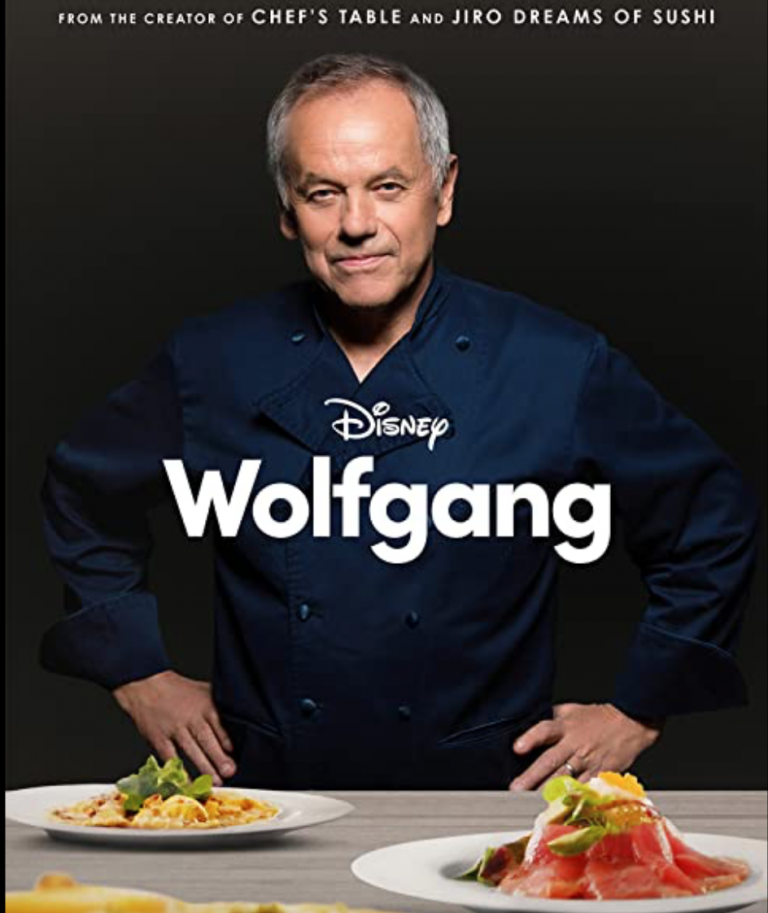
Back in the 1980s and ‘90s、Everybody in The Hollywood wanted to go to Wolfgang Puck’s restaurant Spago, which featured an open kitchen with a wood-burning stove made for serving up fancy pizzas. Born in Austria, Wolfgang Puck studied at three-star restaurants such as “Maxim” in Paris, France and “Hôtel de Paris” in Monte Carlo since he was a teenager, and then moved to the United States in 1973. After that, in 1982, he became the co-owner and main chef of the famous restaurant “Spago” in Los Angeles, California, and became one of the leading star chefs in the United States.
He is the general manager of cooking at the Academy Awards ceremony dinner, and he is still one of America’s leading star chefs, with his cooking show winning the Emmy Awards in 2002. Puck drove to a successful food empire, which at times cost his personal life, and that makes up the narrative thread of “Wolfgang,” a documentary directed by David Gelb, who also made an a fantastic documentary, “Jiro Dreams of Sushi.”
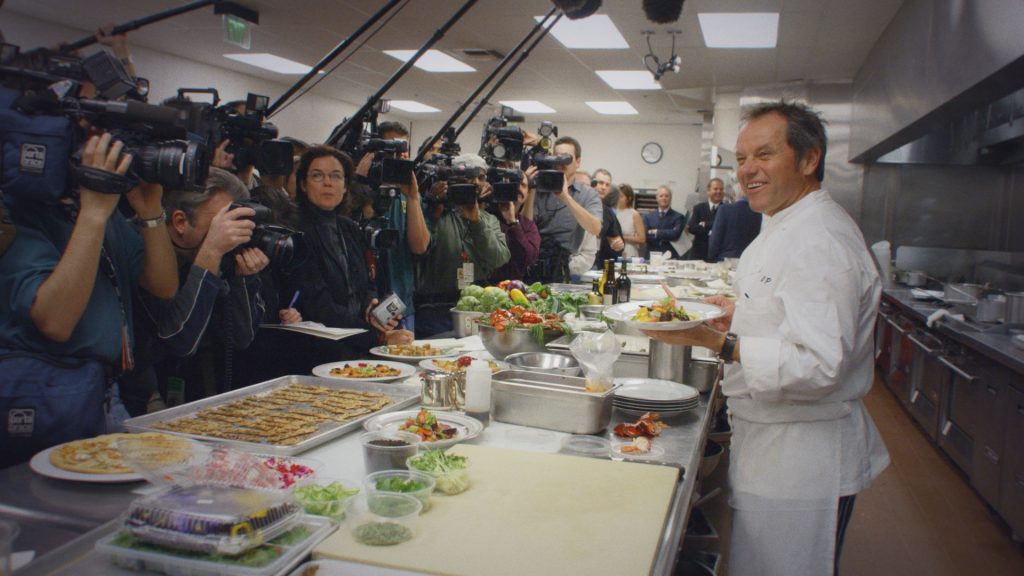
Interview with a Celebrity Chef Wolfgang Puck and Director David Gelb.
Q : How did you get to know each other in the first place? David, I know you grew up in a musical family.
DG: The first time I ever met Wolfgang was when I was maybe fourteen years old, eating at Spago. My dad took me with his friends who were in the music business. Wolfgang comes out and says hi to every single table. I don’t think that he remembers this meeting, but for me, it was very impactful. Later, I think we had some time to talk very briefly at the Bel-Air Cookout, which is a wonderful time where all the chefs in LA come together and cook for charity. Then we started talking about making the film together a little while later.
Q : The film talks a lot about influences and everything else. Wolfgang, you had moments of wondering if this was good enough or not, people like Raymond Thuilier at Baumaniere, did he ever say, well done, I’m really proud of you? The people you encountered, like family, when they look back at what you’ve done and how you never went back home, did you ever get a moment of perhaps, validation, from any of them? Did you hear from them, and what did they say?
WP: My mother was very quiet all the time. She was very proud of me, and proud of my sister, who was the head of a school. My stepfather, when I became successful, he turned the whole jacket around and said I was successful because of him. If I would have been nice to you, you would have been nothing. So he found an answer for himself. I said, you know, that doesn’t mean you had to beat me up, or beat my sister up. He was still a terrible father. I told him, whatever ingredients it took to make me successful, I don’t think the stick was the right ingredient. When I went to Baumaniere, the first time that Mr. Thuilier was cooking next to me, I was making a sauce, and he was tasting it, and he said, oh, add a little pepper and a little salt, and he said, now it’s good.
But when he makes something and he said taste it, it’s good, I said, oh, put in a little lemon juice and pepper and chili in there to make it right, he said okay, and did it. I was the only one who actually said add something or do something to the sauce he made. All the other young chefs always said, ooh, it’s so delicious, Mr. Thuilier. I always let him have it. If he does that to me, even if I’m nineteen years old, I’m going to do it back to him. He was seventy at that time. He really appreciated me. When he went on vacation or just to Paris for a few days, he always told the chef in the main restaurant, I want Wolfgang to do the sauces. I want Wolfgang to be here. Even if it was my day off, he says no, you have to come in and be in the restaurant when I’m not. That made me feel very good. He never said it to me, you’re a great cook, but I knew the way he acted. Actions sometime mean more than talking. It gave me confidence, made me feel good, and made me go away from my stepfather who said I was good for nothing.
Q : Wolfgang, what was your first reaction after seeing this documentary?
WP: You know, I did not really know where David was going to go with the story. There’s so much in my life. I know we didn’t go film all the restaurants around the world. David in his head had a clear vision of what this story should be, and how he wanted to tell the story. What is really great about this story, which nobody knew, was the beginning of my life. Everyone knows me from Spago and the Oscars and things like it. But nobody knew the adversity, the difficult time I had as a kid. Hopefully that story will inspire a lot of young people today who have similar problems with their parents, with their boss, or with whoever. That true perseverance and going through adversity and overcoming it, they can become successful. I always tell people, no is not an answer. You have to find a better way.
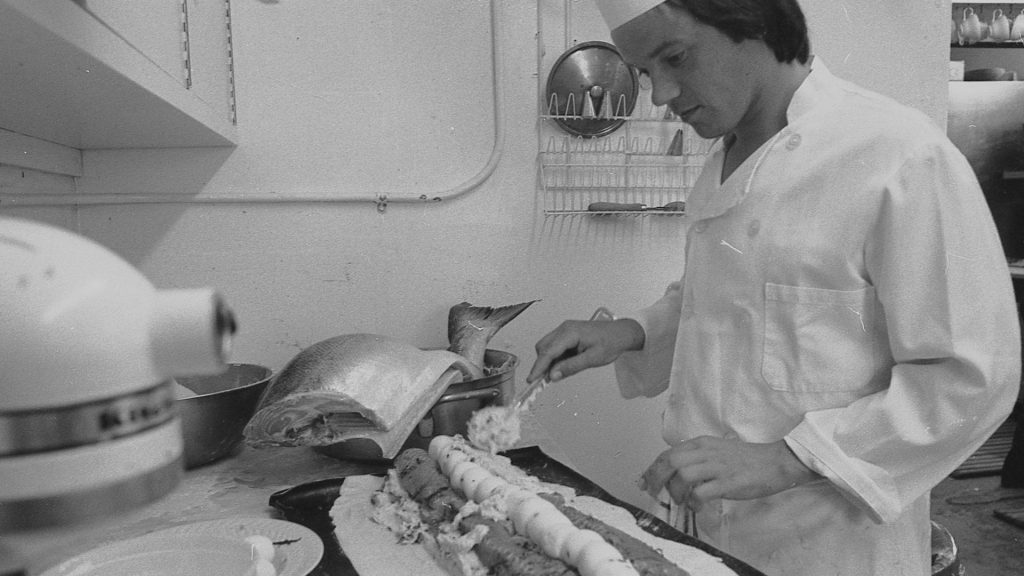
Q : How much did the open kitchen in the 1970s revolutionize the restaurant industry?
WP: Everybody knew, at least in America and Europe, the owner of the restaurant, the maître d’ of the restaurant, but the chef was always in the back. A prime example was that, when I started at Ma Maison, Patrick was the owner, out there in this three-piece suit with a tie, walking around and kissing the women. If someone asked about the food, he said it’s my food, it’s my recipe. I remember when they asked me to be on the TV, and he said, no, Wolfgang doesn’t do TV, I do TV. I had to make him a dish, and he just put it in a pan, or mixed a salad, or put something on top of the salad. He really thought he was the important one. The funny thing was that the restaurant was not successful at all. As a matter of fact, my first paycheck bounced, so he gave me a small piece of the restaurant. Then the restaurant got better, even up to today, he still thinks he was the most important ingredient at Ma Maison. Three years after I left, Spago was very successful and he closed his restaurant. His arrogance and his ego did not change.
DG: I’ll just add that the idea of what Wolfgang was trying to achieve was showing that the kitchen should be open. The kitchen is where the action happens, it’s where the food comes from. It’s the beating heart of the restaurant. They could see the fire. They could see the grill and the pizza oven, everything going. That really changed the way people looked at cooking.
WP: It was such an important part for people to see the chefs there, that they were actually doing the work. All of a sudden they were center stage, just like in a theater. You don’t put the curtain and have people playing. You open the curtain and you put the lights on, and my kitchen at the first Spago was like that. It actually had stage lights to light up the kitchen, the restaurant, the chefs, and not so much the restaurant. It was really a great experience, and it was a new experience for all the guests. They had never seen a thing like that. A white tablecloth restaurant which was noisy because of the kitchen. People talking, picking up the food and things like it. It was such a different experience. Nobody walked around in a black tuxedo and said, monsieur, can you speak French, or can you pronounce Gevrey-Chambertin. I tried to keep it really simple, and said the waiters have to be the friend of the customer. They are working for the customer, not for me.
Q : Given that you left Patrick, it’s amazing that he agreed to appear in the documentary. Did you leave on good terms, and how was he when you asked him to talk about those days at Ma Maison?
WP: I have two bad divorces. One with Patrick, and one with my ex-wife. With both of them, I didn’t talk for many years. When Patrick got sick and had cancer, I actually hosted a birthday party for him at Spago about ten or eight years ago. With my ex-wife, I still don’t talk. With Patrick, I don’t know. His head is still so different. When I watched the documentary and saw him speaking, saying that, Wolfgang, when he came to Ma Maison, he didn’t know how to cook for the Americans, he had no business – he didn’t know how to cook! I remember at the beginning, I tried out a dish with him. He loved calf’s liver, but well-done. I said, who wants to eat calf’s liver well-done, it should be pink inside at least! I made him a calf’s liver. It wasn’t cooked enough. He sent it back twice. The third time, I put so many chilies on it, I sent it back out, he ate the whole thing and said, this was delicious. I said, okay, this guy has no taste.
DG: Patrick was glad to be in the film because he has a very strong opinion about how things went during that time. It’s always interesting when you can see the contrasting points of view. It was a metaphor for the change between the power of the restaurateur versus the chef. Wolfgang decided he’s going to go out on his own, and he’s going to make his own restaurant. And he’s going to put his chef at the center stage. I think that really set a trend that gave the chef much more power, and rightfully so, because they’re the ones that are feeding the customer, and the customers are coming to eat their food. So that was a big change. But Patrick was very generous with his time, and he was very honest with his opinions.
WP: He really has his own opinions, and even in failure, he did not change his opinions. I said, you know what, it’s the same guy the way he was when I was there. I’m not important, I’m not the first violinist, I’m somewhere in the chorus, part of the other violins. That was one of the reasons I left, and luckily so, because when I found the spot where Spago was, I told Patrick, we have to form a restaurant management company, and we have to be fifty-fifty. He looked at me and said, I’m always going to own fifty-one percent. I said, yes, I’m going to own fifty-one percent, and that was it. After three weeks, everybody started to talk. Wolfgang is leaving, he’s going to open his own restaurant, and this and that. He got so jealous of the talk and told me to leave the restaurant. He cut my credit card in half. He took the restaurant car away. One day I woke up and went outside on the sidewalk, my car is gone, I said, shit, somebody stole my car. I called up the secretary at Ma Maison because I didn’t talk to Patrick anymore, and she said, no no, we had to call the company and they took the car away because you’re not working here anymore.
Q : Can you share what the most emotional take was while filming this documentary?
WP: Reliving my past. I always tell people, it’s today and tomorrow. I don’t look back a lot. But this really made me relive my past and go through my emotions again. I did not even know these emotions were still buried deep down, and they came up to the surface. I got this feeling again. It was really a strong experience, a powerful experience, to be there. A lot of the shots David got in the restaurant are already when I was successful, but that was really hard for me.
DG: Yeah, I would second that. We had heard these very emotional stories about how difficult Wolfgang’s childhood was, how cruel his stepfather was. The hardest part of my job is asking people to relive these very difficult moments. In this case, we even revisited the locations of them. I’m a very empathetic person. I feel like Wolfgang’s emotion and his vulnerability really affected me. I knew if we captured this, it would affect an audience as well. It would make a difference in their lives, it will inspire them to try to rise above the adversity in their life. To try their best and to pursue their dreams.
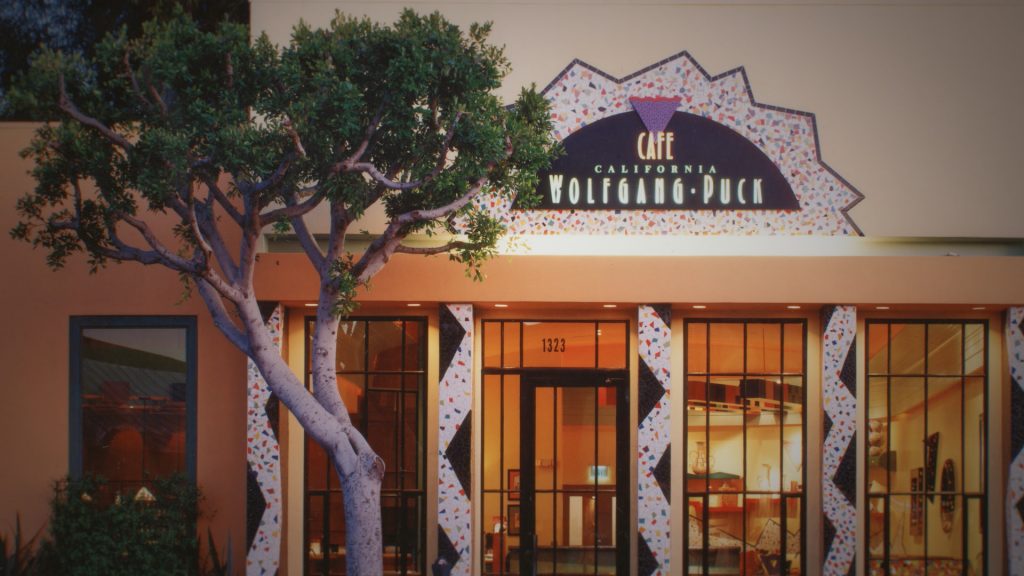
Q : David, when you made Jiro Dreams of Sushi, you took a very technical approach. Did you want to take a different approach here?
DG: This is a very different kind of production. I’m much older now, so I’m not able to play every single role almost, like I did on Jiro Dreams of Sushi. The camera system has gotten much heavier and much more powerful than what I used in that time. This is a production that relied on a great deal of teamwork throughout the entire show. This is a movie. It’s for Disney Plus, and we really wanted Wolfgang’s story. He’s the chef of cinema. He’s done the Oscars. We wanted to make sure that all of the elements of the film were at the utmost cinematic levels. We choose to shoot this film in an anamorphic format, which is really reserved for scripted films and not used so much in documentary.
But we went through the trouble of doing that with very heavy lenses and intense camera packets, massive, massive amounts of data, and then the amount of archival, the history of the story. Jiro Dreams of Sushi, we have historical moments, but it’s very much about what they were doing today. Jiro-san pursuing perfection, repeating the same process every day, and so it’s very much what we’re shooting now. In this case, we’re using a lot of archival materials. We’re drawing from film libraries, television libraries, to bring the past to life, because it’s very much the story of Wolfgang’s origin. That requires a big team, a lot of clearances, and a lot of technical work to make that happen. Jiro Dreams of Sushi is very much an expression of a very small group of artists working together, and in this case, it’s a much bigger team to bring a film like this to life. We really could only have done this with the help of Disney, and we’re very happy that we’ll be on Disney Plus.
Q : Wolfgang, I read about a week ago that there is going to be a Wolfgang Puck restaurant opening in Austria. You said that you were never going to go back. Apparently, it’s going to be at the airport. What are your feelings behind that, especially this being only your second restaurant in Europe after London? You kind of wonder why not more in Europe…
WP: I’m going to open one in the Austro-Hungarian Empire, in Hungary, in Budapest, in one month. In Vienna, at the airport, my brother Klaus works with me and he’s going to oversee it. He oversees all the restaurants in airports already nationally. I always had these misgivings of going back to Austria. I had opportunities but I always thought it’s not the right thing. Having a restaurant at the airport is a different story. People are there, they’re going to get something good and healthy and good-tasting to eat, not to spend two hours or three hours sitting and having a leisurely conservation and having dinner, they’re worrying about when their plane is going to leave. Hopefully, one day we’ll open one, maybe I’m going to go back to Vienna more often. but so far, I never had the desire to go back. I’d much rather go back to Tokyo or someplace like that than Vienna.
Q : Wolfgang, I want to know what’s next for your career.
WP: Well, I’m just at the beginning! We’re going to open more restaurants, do different things, maybe David is going to do a second part of the documentary because I think there are a lot of things which we’re not told. To me, what’s happening today is what’s happening tomorrow. I always look towards the future. I never look that much back. The documentary makes me do that, which is good once in a while, but all in all, I always look forward. We are opening new restaurants, I want to do a new cookbook, I want to do different things, maybe try different cuisines. My wife Gelila is from Ethiopia, so I always threaten her that I’m going to modernize Ethiopian food.
She says, you cannot do that, you’re not even from Ethiopia. I said, we’ll then I’ll go next door to Sudan, maybe. I’m very excited to do new things, and I’m very curious about doing new things. I have never been in your beautiful country, so maybe I have to go there and get inspired there and say, okay, I’m going to have more influences from Malaysia or Indonesia or some Saudi or some Asian, maybe Thailand or Vietnam, part of India and Chinese and Japanese. For me, it’s important to learn and be curious. When I started Spago, for example, I went to the fish market with all my Japanese friends who had sushi bars and Japanese restaurants because I knew they had the best fish because you eat it raw, it wasn’t cooked. Or the hotels, the French chefs, they just ordered the fish, and I went with them to the market and picked up the tuna or the salmon that I really thought was perfect.
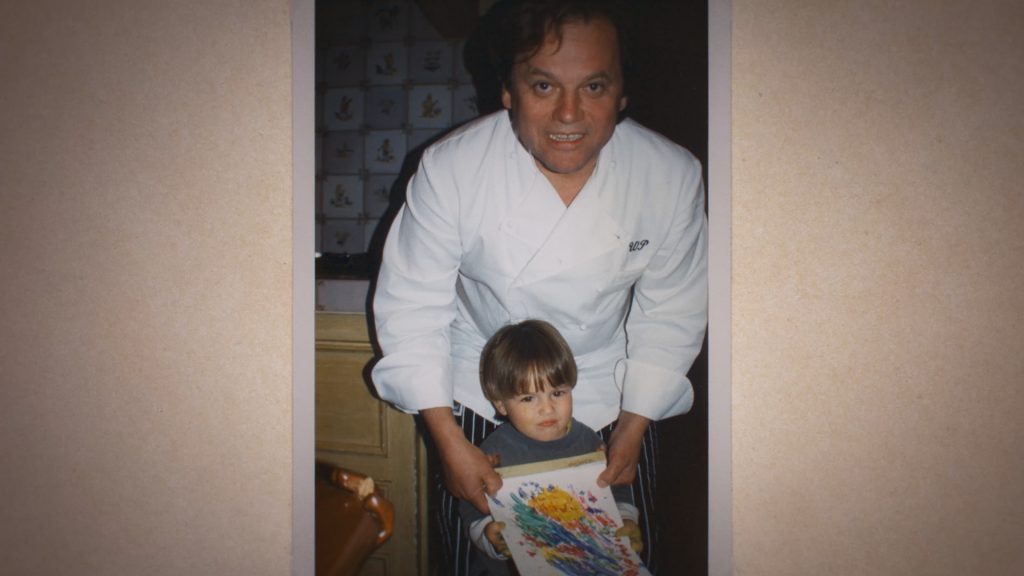
Here’s the official trailer for the film.

